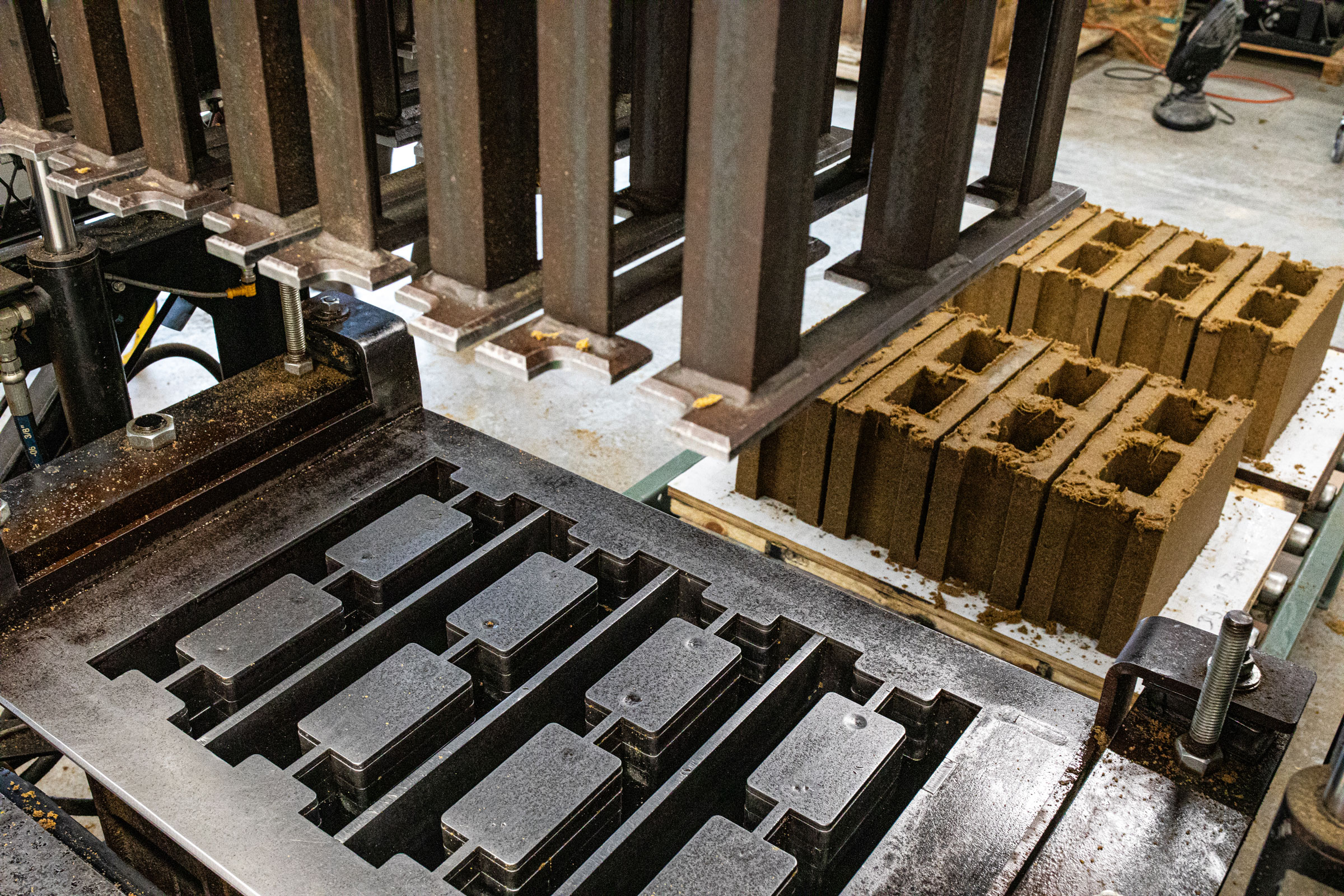Story at a glance:
- Prometheus Materials has created a proprietary process that leverages the natural properties of microalgae to create a zero-carbon bio-cement and bio-concrete.
- The start-up is producing its own precast zero-carbon bio-concrete products initially, ultimately aiming to license its zero-carbon bio-cement mix to existing concrete producers globally.
- Their zero-carbon bio-concrete outperforms traditional concrete on a number of critical metrics.
Concrete is the most common building material on Earth, and it’s easy to understand why. The simple mixture of cement, sand, water, and rock is durable, versatile, low cost, and low maintenance. It also happens to be one of the most carbon-intensive materials to produce. The manufacturing of traditional concrete and cement emits 11 million tons of CO2 each day and is responsible for an estimated 8% of global CO2 emissions each year.
While recent years have seen innovation in the field of sustainable concrete, the majority of solutions—such as replacing limestone in the cement mix with slag—can achieve only a modest-to-moderate reduction in carbon output. Yet one of the most ambitious of these innovations comes from Prometheus Materials, a start-up that’s leveraging the natural properties of microalgae to create a truly zero-carbon bio-cement mixture and line of bio-concrete products.
“What these other companies are doing is taking an incremental approach,” says Loren Burnett, president, CEO and cofounder of Prometheus Materials. “And that’s great. Every percentage point is positive. Where Prometheus Materials stands out is that we’re reducing carbon output by 100%, which is a sea-change difference.”
Mimicking Nature’s Processes
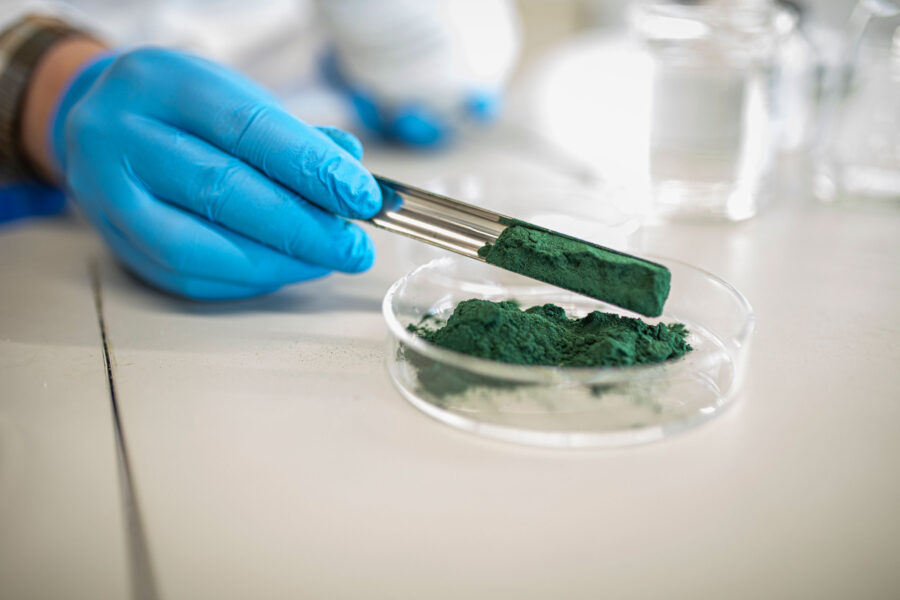
Photo courtesy of Prometheus Materials
The innovation that powers Prometheus Materials’ ProZero™ zero-carbon bio-cement and bio-concrete began as a research agreement between the University of Colorado Boulder and the US Department of Defense (DoD). The initiative sought a way to use locally available and easily transportable raw materials to build strong, durable shelters and roadways for troops and equipment. Achieving these objectives would alleviate the challenges associated with transporting concrete into difficult terrain and hostile territory. “DoD was basically looking for a way to use living materials and local resources to construct protective structures and dependable roads in what are often remote, inhospitable environments,” Burnett says.
There is no way you get to net zero by 2050 without significantly changing the way we deal with cement and concrete.
Over a five-year period scientists and engineers from the university came up with a concept of growing microalgae and stimulating it to create biomineralized calcium carbonate—mimicking the natural production of seashells and coral reefs—that’s then dried into a powder that serves as the base for zero-carbon bio-cement. The success of the project, and the significant environmental implications for the development of carbon-free bio-cement and bio-concrete, led to the pursuit of broader applications in the civilian world through the founding of Prometheus Materials. “I think people are now understanding that there is no way you get to net zero by 2050 without significantly changing the way we deal with cement and concrete,” Burnett says.
Prometheus Materials’ proprietary process eliminates carbon output through both avoidance and sequestration. From an avoidance perspective they bypass the carbon-intensive operations involved in producing traditional cement—from transporting heavy materials to heating industrial kilns to 1,500 degrees Celsius. Embodied carbon from the microalgae and biomineralization is then sequestered within the bio-concrete building components. “This is how you go from a 50% reduction to a 100% carbon reduction,” Burnett says.
A Unique—and Sustainable—Business Model
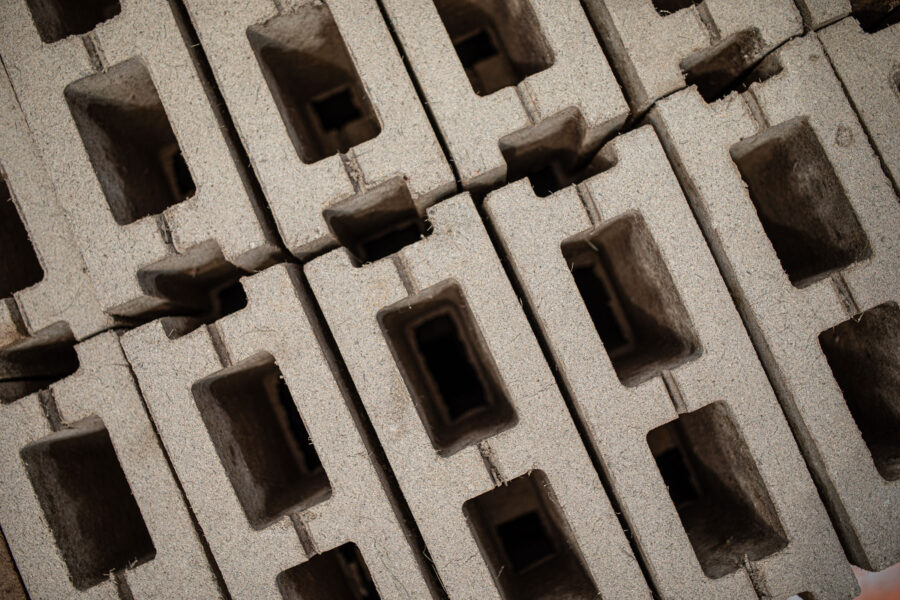
Photo courtesy of Prometheus Materials
Prometheus Materials is currently producing and improving their ProZero zero-carbon bio-cement, bio-concrete and go-to-market precast product—Bio-Block masonry units, a zero-carbon alternative to the traditional concrete cinder block. The Bio-Block has served as proof of concept and demonstration for investors, industry players, and testing.
Their initial ProZero precast product line also includes segmented modular blocks, acoustic panels, paving stones, and grass pavers—which are all being produced at pilot scale. The company is in the midst of its Series B funding round, the proceeds of which will go toward constructing a 35,000-square-foot production facility, hiring roughly 30 additional employees, and launching full-scale production in the first half of 2024.
The firm will continue to produce and broaden its precast product line, explore variations of the ProZero zero-carbon bio-cement and bio-concrete formulations—then ultimately license the technology to the world’s existing concrete manufacturers. This licensing model will involve the shipping of Prometheus Materials’ dried microalgae and calcium carbonate to the manufacturers, who will then use their existing equipment to mix it with water, sand, and aggregate to produce their own zero-carbon bio-concrete products. “Our goal is to be a drop-in replacement within their existing process,” Burnett says. “Our mission is to reach the point where our product reduces CO2 in the atmosphere by a gigaton per year. That’s a lot of CO2.”
Exceptional Performance Metrics
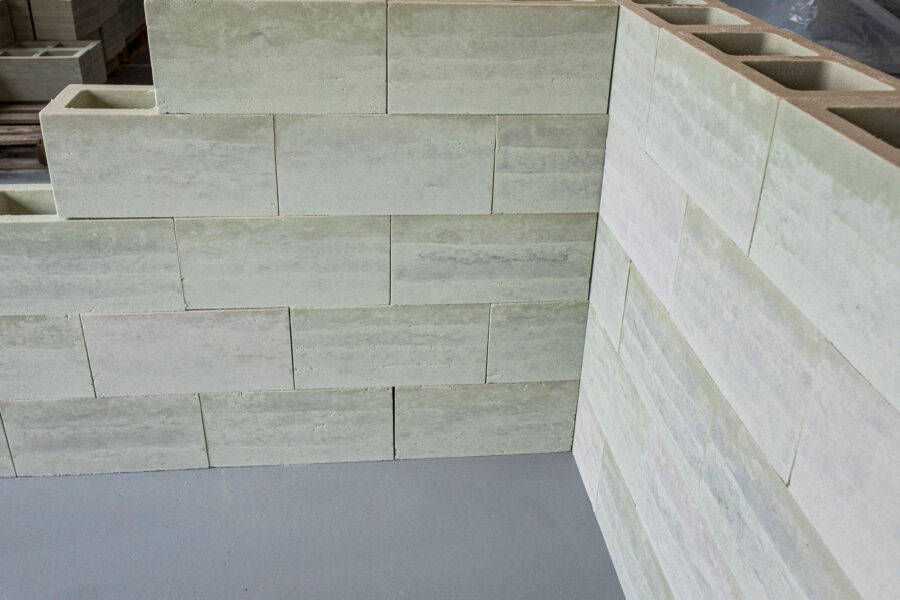
Photo courtesy of Prometheus Materials
One of the biggest question marks surrounding sustainable concrete has been its performance compared to traditional concrete. Following independent testing, Prometheus Materials’ zero-carbon products were found to have mechanical, physical and thermal properties that are comparable or superior to Portland cement-based concrete.
The company’s zero-carbon bio-concrete is approximately 15 to 20% lighter in weight, which provides both economic and environmental advantages when it comes to shipping. Its compressive strength rivals that of traditional concrete, while its flexural strength—a measure of the stress a material can handle without stretching or breaking—is three to four times greater. “This degree of flexural strength will open up quite a few new market opportunities that traditional concrete just can’t fulfill,” Burnett says.
The bond strength of the material is three times better, with a Modulus of Rupture (MOR) of 660 to 990 PSI versus traditional concrete’s 200 to 325 PSI. The zero-carbon bio-concrete’s superior strength reduces the need for steel reinforcement in some applications.
Prometheus Materials’ ProZero zero-carbon bio-concrete exceeds ASTM performance requirements and has enhanced blast resistance compared to traditional concrete. In the category of sound absorption, the material performs 12 times better—having a Noise Ratio Coefficient (NRC) of 0.60 vs. 0.05 for traditional concrete—with sound transmission testing currently underway. “Traditional concrete basically echoes all sound,” Burnett says. “The acoustics of it are horrible.”
Thermal insulation results find the Prometheus Materials product to be two times better, with an R-Value/Inch of 0.40 versus traditional concrete’s 0.20. The material also reduces thermal transmission by 90%, thereby reducing operational carbon in addition to eliminating embodied carbon. “If you have an external wall made of traditional cinder blocks and it’s cold outside, those blocks will transmit that temperature to the inside—so then you have to turn on your heater and burn carbon to warm your room,” Burnett says.
Metrics like these show that there’s clearly no sacrifice when choosing to be more sustainable within this category of building materials.
Industry Buy-In
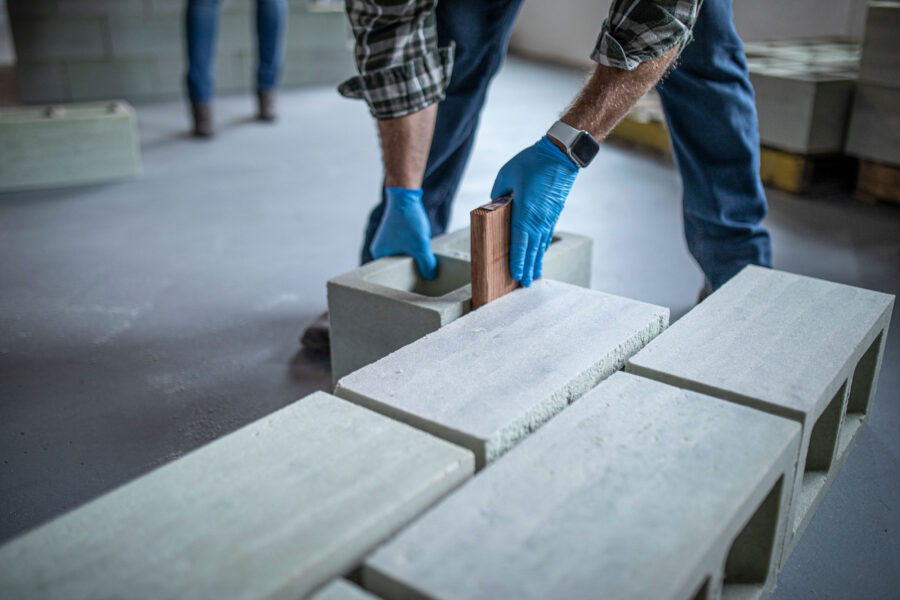
Photo courtesy of Prometheus Materials
Though still in its pilot production stage, the promise of Prometheus Materials and their ProZero zero-carbon bio-cement and bio-concrete is capturing the interest and support of players across the industry. Among their lead investors is global architecture firm Skidmore, Owings & Merrill, who continually collaborates with the company on a variety of projects and initiatives.
While architects have traditionally been the biggest advocates of sustainable building solutions, Prometheus Materials has also connected with those on the front lines of construction—joining forces on testing and demonstration with the International Masonry Institute. “These union masons were actually excited about working with our new products,” Burnett says. The masons had a particular appreciation for the materials’ constructability qualities—such as being able to use their existing tools and techniques, not having to pre-drill holes to place screws and anchors, and more.
Prometheus Materials has multiple projects underway—including an adaptive-reuse and seismic-retrofit using Bio-Blocks, installations of bio-concrete pavers at a major outlet mall and the facilities of one of the world’s largest utility companies, and at the University of Colorado Boulder where Bio-Blocks will be incorporated into a $75 million building rehab.
“Forward-thinking people and organizations understand that continuing to do business with the current state of concrete products is simply not sustainable. Things have to change,” Burnett says. “We represent the future of these people, organizations—and the built environment overall.”

